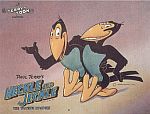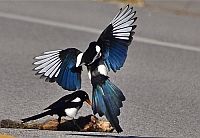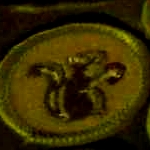Magpies are birds with an identity crisis. They have a lovely, timeless plumage that will always walk Paris runways with confidence, regardless of what the new black (or white or blue) is this year.
They eat roadkill.
They have this quite acceptable, relatively benign call.* It’s a sort of mezzo “squayk” that is neither the shrill screech of those millions of annoying birds nor the gravelly complaint of their grumpiest feathered friends.
They scavenge garbage.
 Based on their dining habits, I would have expected something more like a vulture’s repulsive bald red head and a grackle’s screechy dry-heave call. No wonder their cartoonist, Paul Terry, did a significant make-over on the world’s two most famous magpies, Heckle and Jeckle (right). The real magpie is svelte, vogue, and articulate. Hardly a cartoon character.
Based on their dining habits, I would have expected something more like a vulture’s repulsive bald red head and a grackle’s screechy dry-heave call. No wonder their cartoonist, Paul Terry, did a significant make-over on the world’s two most famous magpies, Heckle and Jeckle (right). The real magpie is svelte, vogue, and articulate. Hardly a cartoon character.
 Really, this is the magpie? I could picture such ditch and dumpster divers making a sound like fingernails upchucking on chalkboard. I envision them in the mismatched Technicolor feathers of a fashion disaster. I imagine an oversized head with turkey neck waggles. I picture them waddling through swamps in a flightless turd-brown hump of a body with gangly blister-red ankles and splayed feet that no manicure could cure. But, no.
Really, this is the magpie? I could picture such ditch and dumpster divers making a sound like fingernails upchucking on chalkboard. I envision them in the mismatched Technicolor feathers of a fashion disaster. I imagine an oversized head with turkey neck waggles. I picture them waddling through swamps in a flightless turd-brown hump of a body with gangly blister-red ankles and splayed feet that no manicure could cure. But, no.
Perhaps the problem here is my own (and either way it has nothing to do with “neck waggles”). I’m referring, of course, to Robert M. Pirsig’s platypus principle. Back in 1991 he challenged all those academics who got upset over the fact that an egg-laying mammal— the platypus— suddenly showed up on the scene after they’d deemed such a creature impossible. Platypus behavior was, of course, absolutely forbidden according to all the years of hard laboratory work these biologists had invested in dissecting all the other mammals they could get their scalpels on. But as Pirsig points out:
The platypus isn’t doing anything paradoxical at all. It isn’t having any problems. Platypi have been laying eggs and suckling their young for millions of years before there were any zoologists to come along and declare it illegal. The real mystery, the real enigma, is how mature, objective, trained scientific observers can blame their own goof on a poor innocent platypus — Robert M. Pirsig, Lila
So perhaps my preconceived notions are wrong. Perhaps it’s time to reevaluate my stereotypes of what a carcass-plucker ought to look and sound like. Gosh, to look so nice, I too might be willing to slurp some roadway raspberries now and then. To sing like that, I too might gobble down a furry Frisbee or two.
Thanks for reading. Cheers,
![]()
* Can’t conjure a magpie call in your head? Here’s an excellent one-minute YouTube clip which balances suspense and payoff beautifully. This one was a bit more theatrical than the one I heard on the walk home tonight.
Roadkill photo by goingslo. Promotional image of Heckle and Jeckle used per U.S. Copyright fair use.
 The average temperature on the mountain was one degree above zero, not counting wind-chill. You could say participants in this year’s
The average temperature on the mountain was one degree above zero, not counting wind-chill. You could say participants in this year’s  In a time of throwing out the old, embracing the new, and charging boldly deeper into the forest, stop for a moment. Think back to what got you here and what you still believe in. That is what you can revere; that is a path you can continue to follow. And while you’re stopped, keep an eye out for squirrels. Now which way was it that you were headed?
In a time of throwing out the old, embracing the new, and charging boldly deeper into the forest, stop for a moment. Think back to what got you here and what you still believe in. That is what you can revere; that is a path you can continue to follow. And while you’re stopped, keep an eye out for squirrels. Now which way was it that you were headed?